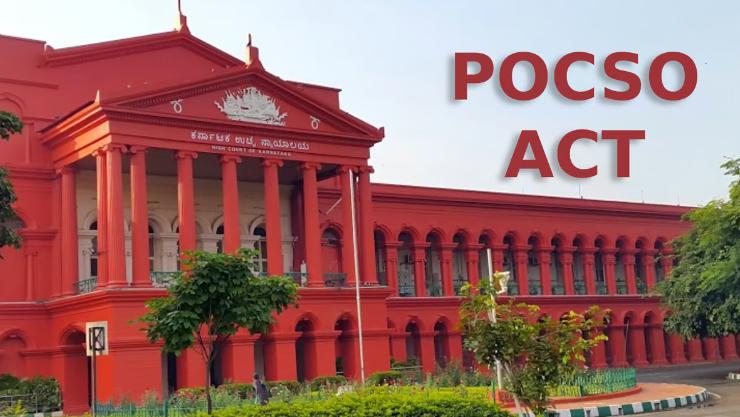Karnataka High Court Quashes POCSO Case (GS Paper 2, Polity & Governance)

Why in News?
- On July 29, 2024, the Karnataka High Court made headlines by quashing proceedings under the Protection of Children from Sexual Offences (POCSO) Act, 2012, against a 23-year-old man accused of raping a minor.
- The accused had subsequently married the minor.
- The court's decision includes a stipulation that criminal proceedings could be reinstated if the man abandons his wife and child in the future, aiming to ensure the welfare and protection of the mother and child.
How Did the Court Justify the Quashing of the Case?
- Accused’s Counsel Argument: The defense argued that the accused and the victim were in a consensual relationship and that the crime was reported only after the parents consented to the marriage. Both families supported the union, which was highlighted as a factor in the case.
- State’s Counsel Argument: The prosecution contended that the severity of the offence, which carries a potential prison sentence of up to ten years, warranted the continuation of the trial. The state’s counsel emphasized the need to uphold the seriousness of the crime.
- Court's Decision: The court took a nuanced approach, noting the following:
- Protection of Victim and Child: The court acknowledged that proceeding with the case without resolving the matter could leave the mother and child vulnerable to societal stigma and potential harm.
- Victim’s Potential Hostility: It was anticipated that the victim might become hostile, making it difficult to secure a conviction.
- Ground Realities: The court recognized that prolonging the trial could cause unnecessary distress to the parties involved and overshadow any eventual acquittal.
What is the Protection of Children from Sexual Offences (POCSO) Act, 2012?
The POCSO Act, 2012, was enacted to address gaps in India's legislative framework concerning child sexual abuse, reflecting global standards established by the United Nations Convention on the Rights of the Child (1989). Key features of the Act include:
- Penalties: Severe penalties, including up to 20 years of imprisonment or the death penalty for aggravated penetrative sexual assault.
- Need for the Act: Before POCSO, the Indian Penal Code (IPC) lacked specific provisions for child protection, especially concerning male children and clear definitions of sexual offences.
General Principles of the POCSO Act
- Right to Dignity: Children must be treated with respect and compassion.
- Right to Life and Survival: Ensures a secure environment for children, as mandated by Article 21 of the Constitution.
- Right Against Discrimination: Guarantees fair treatment without discrimination based on sex, religion, or culture.
- Right to Preventive Measures: Includes training children to recognize and prevent abuse.
- Right to be Informed: Ensures children are aware of legal proceedings.
- Right to Privacy: Maintains confidentiality to protect the child's privacy.
Trial and Evidence
- Special Courts: Can take cognizance of cases without committing the accused to trial.
- Timeliness: Evidence should be recorded within 30 days, and trials should be completed within a year.
- Medical Examination: While crucial, physical injuries may not always be present in cases of sexual abuse.
Shortcomings of the POCSO Act
- Last Seen Theory: The Supreme Court has criticized this theory for being weak without corroborative evidence, which may lead to wrongful convictions.
- Consensual Sexual Activities: The Act criminalizes sexual activities involving minors regardless of consent, as minors' consent is considered irrelevant.
- False Complaints: Children are exempt from punishment for false complaints, which may lead to misuse.
- Two-Finger Test: Despite being banned, this invasive test is still conducted, violating the victim's dignity. The Supreme Court reaffirmed in 2022 that such tests are considered misconduct.
- Investigation Machinery: Faulty procedures and unsealed evidence have led to acquittals in some cases, highlighting flaws in the investigation process.
Significant Judicial Pronouncements on POCSO Act
- Bijoy v. The State of West Bengal (2017): The Calcutta High Court emphasized protecting the dignity of child victims and mandated immediate medical examination and legal aid.
- Vishnu Kumar v. State of Chhattisgarh (2017): The Chhattisgarh High Court underscored the need for comfort and flexibility for child witnesses during proceedings.
- Dinesh Kumar Maurya v. State of U.P. (2016): The Allahabad High Court noted that injuries are not necessary to prove sexual assault, and courts must consider the potential for false allegations.
- Sunderlal v. The State of M.P. (2017): The Madhya Pradesh High Court addressed the rights of minors seeking pregnancy termination, highlighting that parental consent suffices and DNA tests must be preserved post-termination.
Conclusion
- The Karnataka High Court's decision to quash the POCSO case reflects a complex balancing act between legal principles and real-world considerations.
- While the POCSO Act aims to offer robust protection against child sexual offences, its implementation has faced challenges and criticisms.
- The court’s decision highlights the need for judicial sensitivity to the nuances of each case while ensuring the protection and welfare of children involved.


